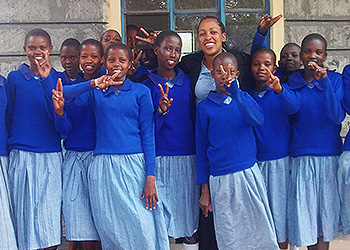MGEF’s Scholarship Program focuses on increasing enrollment of Maasai girls, doing everything possible to ensure that they succeed in school, and giving every student the opportunity for economic independence.

Getting girls in school
MGEF works with the staff in Kajiado, Kenya, and 56 volunteers to identify girls who are not enrolled in school or who are at risk of dropping out of school because of early marriage. The volunteers represent multiple locations throughout the Kajiado County so that benefits are broadly offered. The circumstance of each girl is verified at three levels: the local level, the division level, and the institutional level. Volunteers submit applications after visiting the applicant’s family home (manyatta) to verify that a scholarship is justified. The application is submitted to a Kajiado Board member, who also verifies the circumstances described in the application. When funding becomes available, the Kajiado Board of Directors meets to review applications and offer scholarships to those who are most in need. Occasionally, fast action is required for urgent needs, such as a suddenly announced wedding, or change in economic circumstances.

Keeping girls in school
MGEF is committed to each student’s success. Girls are enrolled in boarding schools, where they will receive better nutrition, structured study time, and health care, and they will also be away from family and peer pressure to marry when they reach puberty. Report cards are collected after each term: Kenya schools operate on a trimester system with school breaks in April, August, and December. Any drop in grades is immediately investigated. An MGEF volunteer visits the school and even the family to identify any problems and help to resolve them.
Older students from the same home area or the same school are encouraged to assist younger students in the academic work, and with their emotional problems. When a Maasai girl reaches puberty, she is often conflicted about education. Most of her peers are getting married and starting their families. That is the way it has always been. Staying in school is the exception, and she is chided by her peers and pressured by her parents to drop out of school and marry, now that she is a woman. They need much encouragement, and MGEF staff, volunteers, and students are there to help them through this difficult stage. They are not dropped when their grades drop. In every case so far, they get through this period and go on to excel in their post-secondary education.
Providing role models
Every year, we host two workshops for our students. The first is a reception that brings together students, parents, role models and special speakers. We also hold an annual 3-day mentoring workshop for our students. The agenda includes discussion of the social barriers to academic success, including pressure for marriage, self-esteem, standing up for oneself, pressures for sex, which are most intense during secondary school years, and setting goals for the future. The workshop also creates a system for MGEF alumni and college students to act as mentors to secondary students during the most vulnerable years.
Fostering economic independence
MGEF staff meets with every secondary school graduate to help them select a school and field of study with a viable job market in Kenya. Our work is not complete until each student has the knowledge and skills to enter the workforce.
